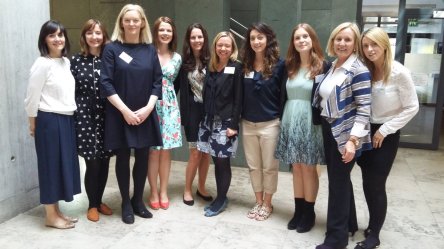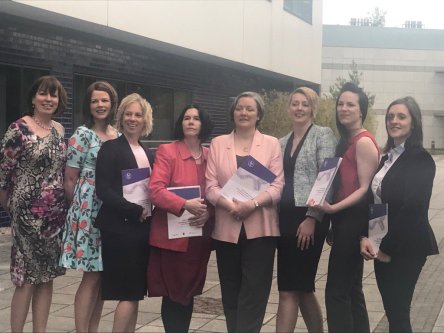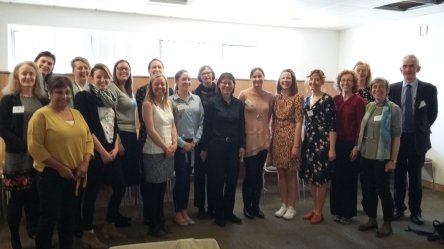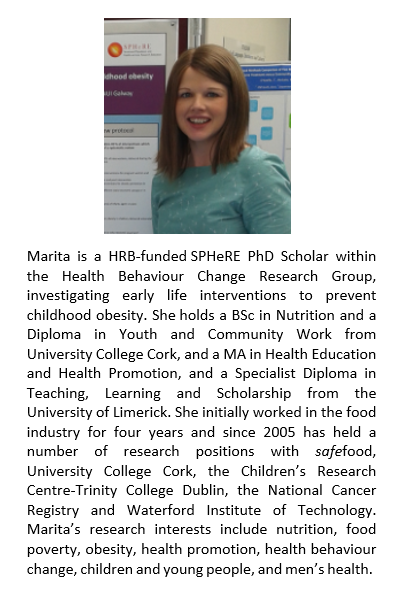
By Marita Hennessy
Marita is a second year PhD student in NUI Galway. In this blog she will share with us some of her experiences and her journey towards organising the POCKETS event.
I am coming to the end of the second year of my PhD which is looking at early life interventions to prevent childhood obesity. I’m on the SPHeRE Programme (Structured Population and Health-services Research Education, funded by the Health Research Board) so my first year was spent undertaking six foundational taught modules and drafting my research proposal. I also completed a 10-week national placement with Dr Phil Jennings, Director of Public Health and Public Health Lead for Child Health within the Health Service Executive. I started my first PhD study in September, a systematic review, so that has been keeping me busy, and challenged! I was also fortunate to complete my international placement in March this year: I spent three weeks in Australia, hosted by Dr Rachel Laws at the Institute for Physical Activity and Nutrition, Deakin University.
I started the PhD with the view that I would make the most of every opportunity. In my last role, I was a national research funding officer for almost two years. I worked with academic/research staff and students on sourcing funding to support their research activities. I spent most of my time convincing people that they were well positioned to apply for various grants and/or build their own research teams – something that I wanted to do myself, but needed the push (and a PhD) to just go and do it! I took my motto from that job (“if you don’t ask, you don’t get”) and brought it with me into the PhD!
Applying for funding
One grant that I was particularly keen to apply for was the Irish Research Council’s New Foundations Scheme. This is a small grant which supports research, networking and/or dissemination activities. There’s a nice, short application form and usually about a 50% success rate. I applied for this scheme in 2015, when I had just started the PhD, but was unsuccessful. In 2016 I revised my proposal for the scheme. I drew on what I had learned about policy and practice developments in child health and childhood obesity prevention during my national placement, and the literature I had been reading in this area. I thought it was a good opportunity to bring people together around translating research into practice and vice versa. From a practice perspective in Ireland there are lots of pockets of activity but we seem to have difficulty in scaling this up. Much work is being undertaken by the HSE, and others, in revising the National Healthy Childhood Programme, and implementing both the Nurture Programme-Infant Health and Wellbeing and actions within national obesity action plan: A Healthy Weight for Ireland: Obesity Policy and Action Plan 2016 – 2025. I was keen to bring together researchers, practitioners and policymakers to share experiences and discuss knowledge translation. I had a list of international researchers that I really wanted to engage with – including Dr Laws in Deakin whom I was arranging to go and visit at the time. I approached them to see if they would be interested in being involved, funding dependent, and they all said yes (although at dinner Paulina Nowicka admitted that she only said yes initially because she thought I wouldn’t get the funding – we had a good laugh about that!). I was also determined to build a research element into the proposal. I have been to lots of conferences where delegates are asked to participate in workshops but the results don’t seem to go anywhere. A Healthy Weight for Ireland contains several actions relating to research gaps and knowledge translation so I built them into the proposal too.
Hosting POCKETS
In January 2017, the Irish Research Council contacted me to say that my New Foundations Scheme proposal to host POCKETS (Prevention of Obesity in Childhood: Knowledge Exchange and TranSlation) was successful. My hypothetical conference suddenly became a reality! One of my colleagues on the CHErIsH study, Dr Karen Matvienko-Sikar in the ESPRIT Research Group at UCC also received a New Foundations Award for COS-IF: Core Outcome Set for Infant Feeding. We both had similar knowledge exchange elements to our proposals so we decided to combine our efforts. The Association for the Study of Obesity on the island of Ireland (ASOI) also kindly agreed to extending their Annual Conference 2017 to 2 days so Karen and I co-hosted the first day of the conference on childhood obesity prevention with the ASOI, while treatment of childhood obesity was the focus of the second day. I was delighted to have this level of collaboration in hosting the event – bringing even more pockets together than I had originally planned!
Conference presentations
The conference was attended by over 120 people, researchers, practitioners and policymakers, from a range of disciplines.
We were delighted to have the Minister of State for Health Promotion, Marcella Corcoran Kennedy TD, open the conference and officially launch the 4th Childhood Obesity Surveillance Initiative (COSI) Report.

Launch of the 4th COSI Report L-R: Dr Phil Jennings, Ms Marita Hennessy, Dr Mirjam Heinen, Professor Cecily Kelleher, Minister Marcella Corcoran Kennedy TD, Ms Sarah O’Brien, Dr Grace O’Malley, Dr Silvia Bel Serrat
Ms Sarah O’Brien (National Lead Healthy Eating Active Living Programme, Health Service Executive) and Dr Phil Jennings (Director of Public Health / National Lead for Healthy Childhood Policy Priority Programme, Health Service Executive) then set the scene for delegates in terms of policy and practice developments in Ireland in childhood obesity prevention.
During the morning session, chaired by Professor Ivan Perry, Department of Epidemiology and Public Health, University College Cork, presenters covered a range of issues from weight management during pregnancy to the pre-school years. Dr Ellinor Olander summarised the evidence on supporting pregnant women with obesity to engage in physical activity and eat healthily to prevent childhood obesity. The key familial and sociocultural drivers of obesity early in life and how these should be incorporated in planning and conducting family-based interventions was the focus of Associate Professor Paulina Nowicka’s presentation. Dr Grace O’Malley then highlighted the importance of motor development and active play. Professor Mary Rudolf spoke about the centrality of the pre-school years in addressing childhood obesity and drew on lessons from the implementation of HENRY in the UK and Israel.
In the first session after lunch, Dr Silvia Bel Serrat presented an overview of the findings from the 4th Childhood Obesity Surveillance Initiative (COSI) Report for the Republic of Ireland. This was followed by panel discussion with Dr John Devlin (Department of Health) and members of the COSI study team at University College Dublin, Professor Cecily Kelleher, Dr Mirjam Heinen and Dr Silvia Bel Serrat. The session was chaired by Ms Sarah O’Brien, National Lead Healthy Eating Active Living Programme, Health Service Executive.
The final session of the day, chaired by Dr John Devlin, Deputy Chief Medical Officer, Department of Health, focused on interventions and the translation of evidence into practice. Professor Sarah Redsell presented the findings of a study examining the feasibility and acceptability of using digital technology for Proactive Assessment of Obesity Risk during Infancy (ProAsk) with UK Health Visitors and parents. Dr Rachel Laws addressed the development and real world translation of scalable approaches to prevent childhood obesity in early life drawing on lessons from Australia. Professor Pinki Sahota outlined the process of utilising research to tackle the growing issues of childhood obesity, health and wellbeing in a multi-ethnic population.
Copies of all the presentations can be viewed/downloaded here.
Posters on a wide range of issues related to childhood obesity were presented at the conference. Congratulations again to Dr Marian Faughnan, safefood on winning the Prevention Poster Prize for “Evaluation of the Community Food Initiative Programme 2012-2015” and to Louise Tully, Louise Tully, Health Promotion Research Centre, NUI Galway, for winning the Overall ASOI 2017 Poster Prize for “Weaning to solid infant foods among disadvantaged parents on the island of Ireland: Emerging influences on practices”.
The science bit! Identifying knowledge gaps for childhood obesity prevention research and barriers and facilitators to knowledge translation
On day one of the conference we conducted two hour-long workshops with delegates (who were available to, and consented to, participate in the research). In the morning workshop, 77 delegates, in ten different groups, identified and prioritised policy-relevant knowledge gaps for childhood obesity prevention research. We used the nominal group technique: each of the ten groups identified their top three priorities. A wide range of issues were discussed by groups including implementation science, evaluating and scaling up programmes, supports for parents and health professionals, and whole systems approaches.
In the afternoon workshop, 68 delegates discussed and ranked barriers and facilitators to knowledge translation. Barriers discussed included limited funding and resources; lack of time and training; mismatch between policy, research and practice worlds. A range of facilitators were identified, including engaging key stakeholders from the outset; training and resources; appropriate communication channels and language; political will.

Day 1 workshop facilitators
L-R: Dr Colette Kelly, Dr Jenny McSharry, Dr Caroline Heary, Ms Marita Hennessy, Dr Michelle Queally, Dr Molly Byrne, Dr Elaine Toomey, Dr Karen Matvienko-Sikar, Professor Catherine Hayes, Ms Natalie Wallace. Missing from photo: Ms Niamh McGrath
On day two of the conference we held a closed meeting with a group of 14 stakeholders to reach consensus on the knowledge gaps for future research in childhood obesity prevention that were identified on day one. The group comprised national and international researchers, policymakers and practitioners. Participants discussed, clarified and amended the 20 knowledge gaps identified, and participated in two further rounds of voting to rank their top five priorities. A range of issues and gaps were discussed from implementation science, to physical activity, to addressing the social determinants of health.
We are currently writing up the research component of POCKETS for publication: follow updates on the project via ResearchGate.

Day 2 consensus meeting participants and facilitators
L-R: Dr Fionnuala Cooney, A/Professor Paulina Nowicka, Professor Pinki Sahota, Ms Sarah O’Brien, Ms Milica Atanackovic, Dr Ellinor Olander, Dr Molly Byrne, Dr Michelle Hardie-Murphy, Ms Niamh Ryan, Professor Sarah Redsell, Dr Miriam Owens, Dr Rachel Laws, Ms Marita Hennessy, Dr Jenny McSharry, Dr Marian Faughnan, Dr Caroline Heary, Professor Mary Rudolf, Mr Ronan Toomey
A final word…of thanks
A huge thank you to everyone involved in ASOI 2017 and POCKETS including speakers, delegates and research participants, session chairs, poster presenters, and workshop facilitators. I am especially grateful to the ASOI and Dr Karen Matvienko-Sikar for their support and generosity in co-hosting the event.

congratulation for your hard-work and passion on childhood obesity prevention.this is a critical issue that is of concern to parents around the world. some of the tips could be to;Help your kids understand the benefits of being physically active. Teach them that physical activity has great health benefits like:Strengthening bone,Decreasing blood pressure,Reducing stress and anxiety.
Help kids stay active.Children and teens should participate in at least 60 minutes of moderate-intensity physical activity most days. e.g Brisk walking,Playing tag,Jumping rope,Playing soccer,Swimming.
Encourage healthy eating habits. Small changes can lead to a recipe for success.
Remove calorie-rich temptations. Treats are OK in moderation, but limiting high-fat and high-sugar or salty snacks can also help your children develop healthy eating habits
LikeLike
Pingback: Policy Brief - Childhood obesity prevention: Co-created research priorities using the nominal group technique - ASOI
Contact him today and get rid of that ((herpes cure)) in your body robinson_bucler@ yahoo. com……………………🙂🙂🙂🙂
erectile dysfunction
pregnancy issues
((herpes cure))
diabetes type 1 / 2
fat belly and swollen stomach
heart failure
((kidney problem))
LikeLike